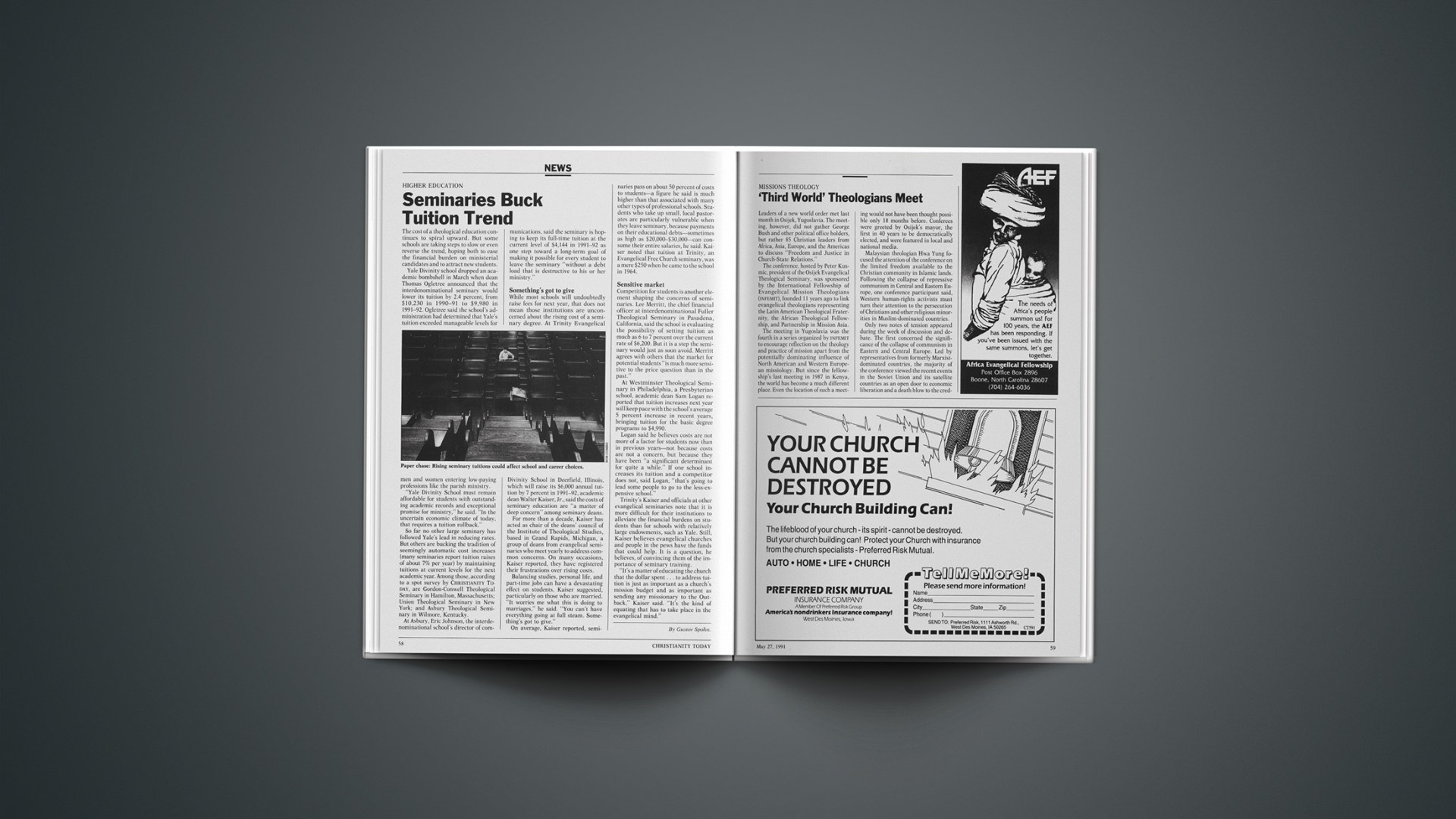The cost of a theological education continues to spiral upward. But some schools are taking steps to slow or even reverse the trend, hoping both to ease the financial burden on ministerial candidates and to attract new students.
Yale Divinity school dropped an academic bombshell in March when dean Thomas Ogletree announced that the interdenominational seminary would lower its tuition by 2.4 percent, from $10,230 in 1990–91 to $9,980 in 1991–92. Ogletree said the school’s administration had determined that Yale’s tuition exceeded manageable levels for men and women entering low-paying professions like the parish ministry.
“Yale Divinity School must remain affordable for students with outstanding academic records and exceptional promise for ministry,” he said. “In the uncertain economic climate of today, that requires a tuition rollback.”
So far no other large seminary has followed Yale’s lead in reducing rates. But others are bucking the tradition of seemingly automatic cost increases (many seminaries report tuition raises of about 7% per year) by maintaining tuitions at current levels for the next academic year. Among those, according to a spot survey by CHRISTIANITY TODAY, are Gordon-Conwell Theological Seminary in Hamilton, Massachusetts; Union Theological Seminary in New York; and Asbury Theological Seminary in Wilmore, Kentucky.
At Asbury, Eric Johnson, the interdenominational school’s director of communications, said the seminary is hoping to keep its full-time tuition at the current level of $4,144 in 1991–92 as one step toward a long-term goal of making it possible for every student to leave the seminary “without a debt load that is destructive to his or her ministry.”
Something’s Got To Give
While most schools will undoubtedly raise fees for next year, that does not mean those institutions are unconcerned about the rising cost of a seminary degree. At Trinity Evangelical Divinity School in Deerfield, Illinois, which will raise its $6,000 annual tuition by 7 percent in 1991–92, academic dean Walter Kaiser, Jr., said the costs of seminary education are “a matter of deep concern” among seminary deans.
For more than a decade, Kaiser has acted as chair of the deans’ council of the Institute of Theological Studies, based in Grand Rapids, Michigan, a group of deans from evangelical seminaries who meet yearly to address common concerns. On many occasions, Kaiser reported, they have registered their frustrations over rising costs.
Balancing studies, personal life, and part-time jobs can have a devastating effect on students, Kaiser suggested, particularly on those who are married. “It worries me what this is doing to marriages,” he said. “You can’t have everything going at full steam. Something’s got to give.”
On average, Kaiser reported, seminaries pass on about 50 percent of costs to students—a figure he said is much higher than that associated with many other types of professional schools. Students who take up small, local pastorates are particularly vulnerable when they leave seminary, because payments on their educational debts—sometimes as high as $20,000–$30,000—can consume their entire salaries, he said. Kaiser noted that tuition at Trinity, an Evangelical Free Church seminary, was a mere $250 when he came to the school in 1964.
Sensitive Market
Competition for students is another element shaping the concerns of seminaries. Lee Merritt, the chief financial officer at interdenominational Fuller Theological Seminary in Pasadena, California, said the school is evaluating the possibility of setting tuition as much as 6 to 7 percent over the current rate of $6,200. But it is a step the seminary would just as soon avoid. Merritt agrees with others that the market for potential students “is much more sensitive to the price question than in the past.”
At Westminster Theological Seminary in Philadelphia, a Presbyterian school, academic dean Sam Logan reported that tuition increases next year will keep pace with the school’s average 5 percent increase in recent years, bringing tuition for the basic degree programs to $4,990.
Logan said he believes costs are not more of a factor for students now than in previous years—not because costs are not a concern, but because they have been “a significant determinant for quite a while.” If one school increases its tuition and a competitor does not, said Logan, “that’s going to lead some people to go to the less-expensive school.”
Trinity’s Kaiser and officials at other evangelical seminaries note that it is more difficult for their institutions to alleviate the financial burdens on students than for schools with relatively large endowments, such as Yale. Still, Kaiser believes evangelical churches and people in the pews have the funds that could help. It is a question, he believes, of convincing them of the importance of seminary training.
“It’s a matter of educating the church that the dollar spent … to address tuition is just as important as a church’s mission budget and as important as sending any missionary to the Outback,” Kaiser said. “It’s the kind of equating that has to take place in the evangelical mind.”










